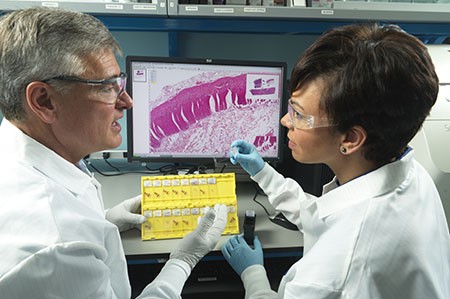Pathology
Pathologists provide a foundational role in exploring the causes and effects of a disease using samples of body tissues or fluids. In toxicologic pathology this foundational role extends to the assessment of the safety of a drug, compound, device or vaccine. The pathologist identifies, characterizes and manages risk versus benefit.

- Necropsy
- Histology
- Histopathology
- Receipt of fixed or frozen tissue, paraffin blocks, or slides
- Pathologist interpretation, consultation, and peer review
- Hematology
- Clinical chemistry
- Coagulation
- Urinalysis
- Biomarkers (standard & investigative)
- Microscopy (including bone marrow analysis)
- Immunohistochemistry(IHC)
- Electron Microscopy(TEM)
- Tissue Cross Reactivity(TCR)
- In Situ Hybridization (ISH)
- Tissue and Target Profiling
- Digital Pathology
- Exploratory Clinical Biomarkers
What's the difference between anatomic & clinical pathology?
Anatomic Pathology
- Analytic evaluations conducted on samples collected from humans and necropsied animals
- Tissue examination
- Nonclinical studies (GLP & non-GLP); only evaluation that will not be repeated in clinical studies
- Single endpoint
Clinical Pathology
- Analytic evaluations conducted on samples collected from living humans and animals
- Fluid examination
- Nonclinical or clinical study (see clinical testing services)
- Multiple collections possible during a study (depending on species)
You might also be interested in anatomic pathology and histology for clinical trial testing
Explore some of our related clinical trial pathology options:

Pathology Publications
- LRRK2 inhibitors induce reversible changes in nonhuman primate lungs without measurable pulmonary deficits.(NCBI)
- Scientific and Regulatory Policy Committee Points to Consider*: Approaches to the Conduct and Interpretation of Vaccine Safety Studies for Clinical and Anatomic Pathologists(NCBI)
- Atlas of Normal Microanatomy, Procedural and Processing Artifacts, Common Background Findings, and Neurotoxic Lesions in the Peripheral Nervous System of Laboratory Animals(NCBI)